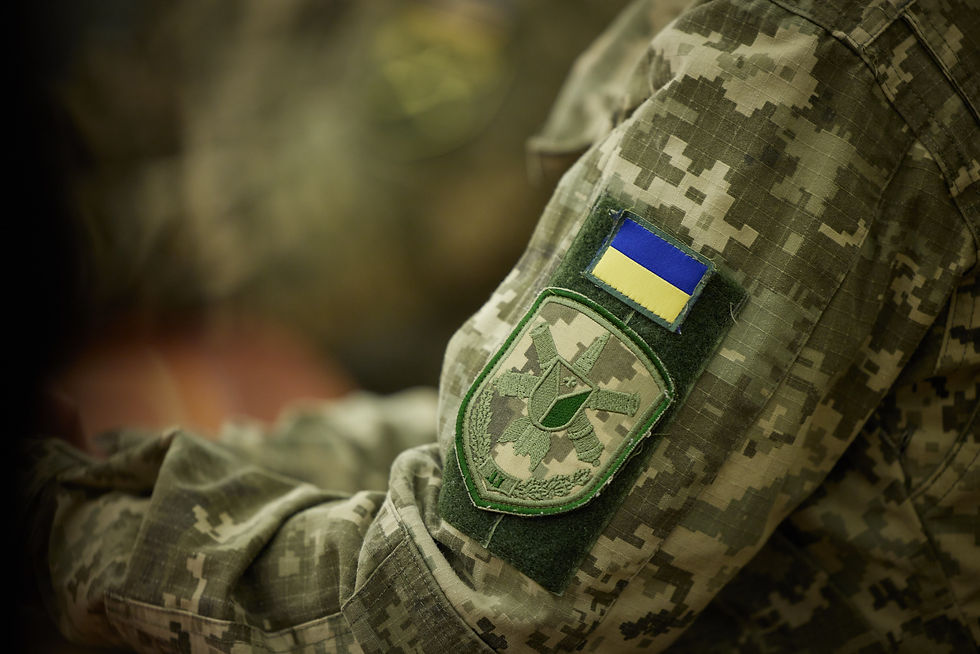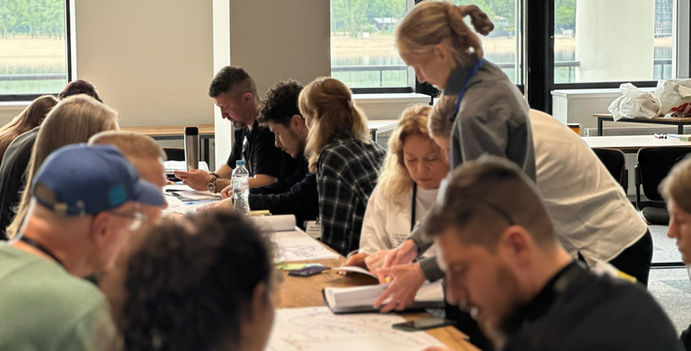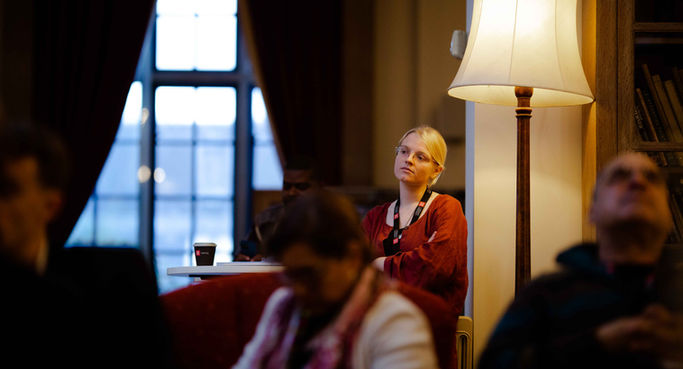OUR Ukraine
RESEARCH & ACTION



VETERAN-LED WORKSHOPS IN KYIV
Building Reintegration Policy on Veterans' Terms
In June 2025, the Corioli Institute, alongside local partners, hosted a two-day series of veteran reintegration workshops at American University Kyiv. The first day created a veteran-only space where participants could share their stories, map their reintegration journeys, and identify what “progress” and a place in civilian communities looks like from their own perspectives.
The second day brought those insights to the table with representatives from government, civil society, international organizations, and the private sector. Veterans led discussions on the gaps they face in accessing services, the stigma and discrimination that persist in workplaces and communities, and the need for a better, more respectful integration into institutions of public life. Together, the group worked through practical exercises to design measurable, veteran-driven solutions to inform the better accommodation of veterans' needs not only on an organizational level, but also in national policy and local programming — from mental health support and peer networks to vocational training pathways and family services.
What participants found most valuable about the workshops:
"A new perspective on showing initiative in communicating with and supporting veterans."
"Understanding the interaction between veterans and society."
"The approach and a format of this workshop which made it sort of exercise and facilitated thinking and active listening."
"Communicating with veterans, seeing the real gaps."
"When veterans shared their experiences and the strategy for developing rehabilitation centers."

ADVISING
THE EU COMMISSION ON VETERAn POLICY
Integrating Veterans' Voices into Security Sector Reform (SSR)
In 2024, the Corioli Institute deepened its partnership with the Folke Bernadotte Academy (the Swedish government’s development agency) under a five-year framework agreement with the European Commission’s Service for Foreign Policy Instruments. This collaboration supports Ukraine’s security sector governance, ensuring alignment with EU accession requirements and NATO standards. Building on our extensive fieldwork and research with veterans, we developed a dedicated Annex on veteran reintegration for the EU’s security sector assessment. Being a cornerstone of our systems-level impact, this work identifies critical reform priorities and practical strategies to strengthen the defense sector’s approach to reintegration.
The Annex highlights the urgent need for a cohesive, well-coordinated reintegration system that addresses the economic, psychological, and social dimensions of transition from military to civilian life. It calls for stronger institutional capacity within the Ministry of Veterans Affairs, better coordination between national and local actors, and the expansion of participatory mechanisms to ensure veterans’ voices guide policy. It also outlines strategies for scaling mental health support, improving access in rural areas, and building sustainable pathways for employment and entrepreneurship. These priorities are designed to help Ukraine and its partners develop a long-term, inclusive reintegration framework that strengthens resilience, social cohesion, and stability.

THEMATIC POLICY BRIEF
SERIES
Conveying What Matters to Veterans Concisely and Accessibly
The Corioli Institute and the Folke Bernadotte Academy (FBA) jointly developed a thematic policy brief series examining the critical dimensions of veteran reintegration in Ukraine. Grounded in direct engagement with veterans, policymakers, and practitioners, the series analyzes the complex challenges veterans face as they transition to civilian life and provides actionable recommendations to strengthen Ukraine’s reintegration systems.
Designed for policymakers, civil society, and international partners, the briefs focus on four key areas: political participation, economic opportunities, gender-responsive approaches, and community-based reintegration. Together, they offer a Ukraine-specific perspective on building inclusive, coherent, and sustainable frameworks that recognize veterans as central to the country’s recovery, resilience, and long-term stability.

Between
frontline
and
homefront
A Roadmap of Reintegration, Resilience and Participation
The Corioli Institute’s flagship report on Ukrainian veteran reintegration combines months of extensive fieldwork across the country with comparative policy expertise. Over 40 in-depth interviews with veterans, policymakers, civil society leaders, and service providers, together with the “Out of War” conference at the London School of Economics, generated one of the most comprehensive analyses of veteran reintegration in Ukraine to date.
Developed with veteran participation at every stage, this work captures the realities of transitioning from military to civilian life; from psychosocial needs and economic challenges to opportunities for civic and community leadership. It has informed policy and programming conversations in Kyiv, Brussels, and beyond, shaping how national actors, international partners, and donors understand and address the needs of veterans and their families. By centering veterans’ voices and building on a data-driven approach, the report offers a clear roadmap for inclusive, sustainable, and responsive reintegration systems, ensuring that every dollar invested delivers the greatest impact in helping veterans build dignified and meaningful futures.
OUT OF WAR
CONFERENCE
Global Insights for the Reintegration of Ukraine's Veterans
In October 2023, the Corioli Institute hosted the “Out of War” conference at the London School of Economics, bringing together veterans, policymakers, practitioners, and researchers from 19 countries. Grounded in fieldwork data and shaped by the direct input of Ukrainian veterans and local practitioners, the event created a generative platform for policy dialogue and innovation, insights from which continue to inform our work in Ukraine today.
Across two days of roundtables, breakout sessions, and collaborative discussions, participants examined the most pressing dimensions of reintegration that were identified in our research preceding the event, including psychosocial needs and economic opportunities to gendered experiences, identity challenges, and the importance of community-based approaches. The format fostered comparative learning, connecting Ukraine’s reality with global experiences of reintegration from other contexts of organized violence. By centering the expertise of veterans from diverse backgrounds and those working closest to them, the conference methodology has made emerging strategies more inclusive, relevant, and actionable.
PLANNED PROJECTS
War, Memory, and Making: Art and Oral Histories of Ukraine’s Veterans and Families
This initiative collects artworks created by veterans and their families from fragments of war, alongside life-history interviews. Together, these pieces preserve the resilience and memory of those who have lived through conflict, transforming destruction into creativity. The project will produce a curated collection, oral histories, and public materials to honor veterans’ experiences and safeguard this living chapter of military history.
Khors (Хорс) AI Platform: Smarter Humanitarian and Reintegration Services
Khors is a just-in-time, AI-driven platform that aligns real-time veteran needs, such as employment, rehabilitation, or housing, with available services. Piloting in Kharkiv, the platform will reduce duplication, accelerates access, and provides actionable data to donors and policymakers. Designed with Ukrainian veterans, it will strengthen reintegration outcomes locally while offering a globally scalable model for humanitarian and development response.
Advancing the Reintegration Arc: Action Research with Ukraine’s Military Intelligence Directorate
This collaborative research initiative addresses the unique reintegration challenges of veterans who have returned to frontline service. By co-producing knowledge with service members, families, and medics, the project develops scalable reintegration models tailored to dual-role and elite personnel. Findings will directly inform psychosocial support systems, peer-based recovery programs, and donor strategies, shifting the conversation from reintegration “after” war to reintegration “during and after” service.
Veterans Securing Tomorrow: US-Ukraine Partnership for Trauma-Informed Demining Excellence
This U.S.–Ukraine university partnership integrates psychosocial healing with technical mine action training, creating a trauma-informed curriculum for veteran reintegration. Over 18 months, the project will train and certify 20–30 Ukrainian veterans, build a cadre of local instructors, and link graduates to employment in demining and reconstruction. The initiative addresses both the urgent shortage of demining professionals and the mental health needs of veterans, advancing national security and U.S.–Ukraine cooperation.













































